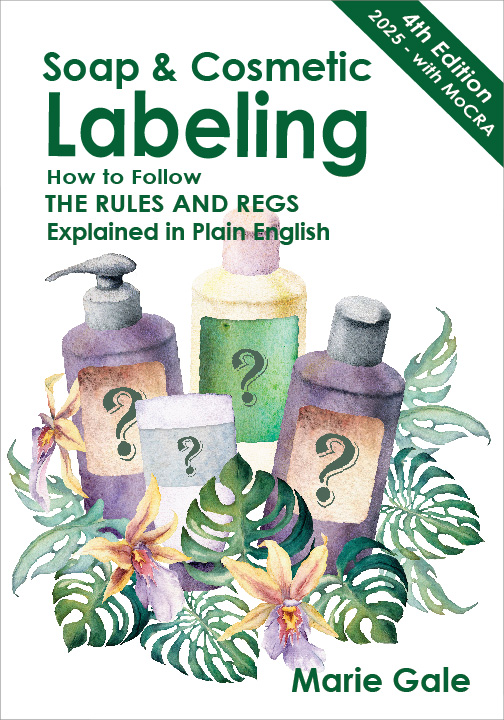The FDA just updated their Warning Letters Address Drug Claims Made for Products Marketing as Cosmetics Claims page with yet more warning letters. That makes twenty-five warning letters issued so far in 2016. And of those, 18 were issued in just the last 3 months! Compare that to nine warning letters in 2015 and only two issued in 2014 and it’s easy to see a pattern.
What are the Violations?
Here is a quick sampling of the types of violations the FDA is citing. These are the “drug claims” made for products marketed as cosmetics that the FDA found on product labels and in product descriptions, websites, and ingredient details.
- “Minimizes swelling when applied soon after skin trauma” (product claim)
- “Lavender… is an antidepressant and is used to calm a stressed spirit, anxiety, and hysteria.”
- “Emu oil is anti-inflammatory, anti-bacterial and anti-microbial…”
- “Relieve itching due to poison ivy/poison oak or any other skin irritation, including eczema and psoriasis” (jewelweed)
- “Rose hydrosol enhances circulation in the skin for cellular regeneration.”
- “Helps stimulate cell renewal” (product claim)
- “Powerful antioxidants help defend against environmental triggers that cause pigmentation.”
- “Commonly used in areas of Brazil to treat inflammatory and painful diseases…” (Mirabilis Jalapa Extract)
- “Rosemary Leaf Extract has antimicrobial properties…”
- “Stimulates healthy collagen production…” (product claim)
- “Spanish Lavender helps inhibit muscle fiber contractions to decrease the look of expression lines.”
- “Rosehip CO2 and Pomegranate CO2 seed oils help rebuild collagen”
- Honeysuckle, Jasmine, Rose Damascena and Carrot Seed Hydrosols aid in reducing skin inflammation…”
- “Frankincense essential oil has antibacterial and anti-inflammatory benefits to the skin, making it ideal for acne-prone skin.”
- “Specially formulated shampoo for those who have Exzema or Psoriasis in the scalp area.”
- “Neem is anti-viral, anti-fungal, and anti-inflammatory”
- “Several studies of Neem extracts in suppressing malaria have been conducted, all supporting its use in treatment.”
- “These essential oils can lower your blood pressure and help hypertension.”
- “Motherwort – A hypotensive”
- “Cayenne – helps lower blood cholesterol levels; to reduce blood pressure, cardiac problems, lipid levels.”
- “Neroli promotes cell growth”
- “Natural sun protection. Ultra-hydrating formula encourages healthy cell regeneration” (product claim)
- “Uses frankincense to balance hormones” (product claim)
- “An excellent alternative to medically administered treatments” (for a lip volumizer)
- “Safe and non-toxic, topical alternative to injections” (for an anti-wrinkle product)
- “Activates epidermal regeneration and targets damage done by free radical agents” (product claim)
- “Helps soothe and has been known to provide anti-inflammatory benefits” (product claim)
- “A natural alternative to Botox and other potentially harmful (and costly) invasive procedures” (for a wrinkle treatment product)
- “Anti-bacterial, anti-viral, anti-fungal and anti-parasitic” (for a face toner)
- “The combined organic ingredients of Red Raspberry Seed Oil (SPF 30-50), Carrot Seed Oil (SPF 30) and Shea Butter (SPF 6-10) assist in providing natural sun protection.”
- “Natural vitamin E is known to… help skin recover from scarring and other damage.”
This is JUST a sampling of the claims cited and is only for some of the warning letters issued in July and August, 2016.
You’ll note that many of the claims made are for natural ingredients and essential oils, and if you research online, you’ll probaby find that there are authoritative documents and even scientific studies to back up at least some of the claims made above. You may have even used vitamin E on a scar, lavender essential oil to treat a headache or stress, or jewelweed to reduce itching.
Unfortunately, the point is not whether or not the product or ingredients provide the benefits claimed. The point is that cosmetics and drugs are different things and you can’t make drug claims for cosmetic products.
Cosmetics vs. Drugs
A cosmetic only changes the appearance, and a drug changes the physical function or structure.
Cosmetics and cosmetic manufacturers are not heavily regulated. They don’t require advance approval and (for the time being) don’t have to register with the FDA.
Drugs and drug manufacturers, on the other hand, ARE heavily regulated. Drugs must be pre-approved (a lengthy and expensive process) or meet already approved standards (for over-the-counter products). Drug manufacturers must register with the FDA and meet good manufacturing practices as established by regulations.
If you want to make cosmetics, then the product and ingredients can only claim to do the things that cosmetics can do (by the definition in the law). That includes cleansing, improving appearance, and beautifying.
If you want to make a product that does more than that, a product that will alter the function or structure of the body or that will cure, treat, mitigate, or prevent a disease, then you need to become a drug manufacturer, follow all the pertinent drug manufacturing regulations, and get appropriate approvals for your drug products.
Summary
There is no doubt that the FDA is increasing their vigilance and surveillance of cosmetic products and manufacturers and issuing more warnings than ever before.
If you make soap or cosmetic products and want to keep out of the FDA spotlight, it would behoove you to review all your product and ingredient descriptions, product labels, and website content to make sure you are staying within the definition of a cosmetic for all your products.
Bottom line: Don’t make drug claims for your products unless you are willing for the FDA (or a State agency) to come a-knockin’ on your door.

Shameless plug!
To really be able to create your own labels that comply with the regulations, get my book from Amazon and use it.
4th Edition – Released March 5, 2025!!!
Or order directly from me (and get a signed copy)!


Leave a Reply